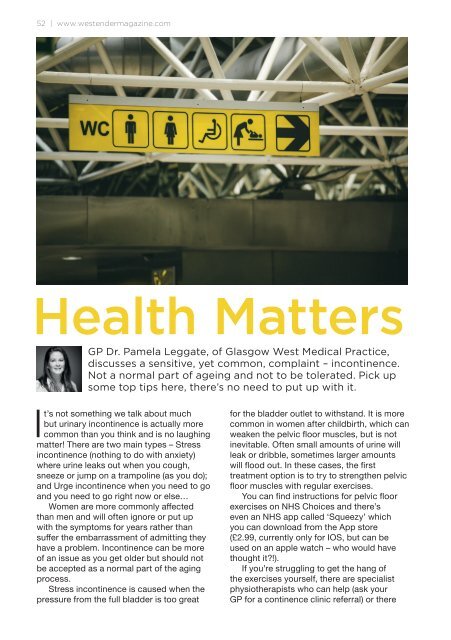WebJulAug2018
shopping, lifestyle, Glasgow west end, business, gift, going out, restaurant reviews, bar reviews, author interviews, artist interviews, local, what's on listing
shopping, lifestyle, Glasgow west end, business, gift, going out, restaurant reviews, bar reviews, author interviews, artist interviews, local, what's on listing
Create successful ePaper yourself
Turn your PDF publications into a flip-book with our unique Google optimized e-Paper software.
52 | www.westendermagazine.com<br />
Health Matters<br />
GP Dr. Pamela Leggate, of Glasgow West Medical Practice,<br />
discusses a sensitive, yet common, complaint – incontinence.<br />
Not a normal part of ageing and not to be tolerated. Pick up<br />
some top tips here, there’s no need to put up with it.<br />
It’s not something we talk about much<br />
but urinary incontinence is actually more<br />
common than you think and is no laughing<br />
matter! There are two main types – Stress<br />
incontinence (nothing to do with anxiety)<br />
where urine leaks out when you cough,<br />
sneeze or jump on a trampoline (as you do);<br />
and Urge incontinence when you need to go<br />
and you need to go right now or else…<br />
Women are more commonly affected<br />
than men and will often ignore or put up<br />
with the symptoms for years rather than<br />
suffer the embarrassment of admitting they<br />
have a problem. Incontinence can be more<br />
of an issue as you get older but should not<br />
be accepted as a normal part of the aging<br />
process.<br />
Stress incontinence is caused when the<br />
pressure from the full bladder is too great<br />
for the bladder outlet to withstand. It is more<br />
common in women after childbirth, which can<br />
weaken the pelvic floor muscles, but is not<br />
inevitable. Often small amounts of urine will<br />
leak or dribble, sometimes larger amounts<br />
will flood out. In these cases, the first<br />
treatment option is to try to strengthen pelvic<br />
floor muscles with regular exercises.<br />
You can find instructions for pelvic floor<br />
exercises on NHS Choices and there’s<br />
even an NHS app called ‘Squeezy’ which<br />
you can download from the App store<br />
(£2.99, currently only for IOS, but can be<br />
used on an apple watch – who would have<br />
thought it?!).<br />
If you’re struggling to get the hang of<br />
the exercises yourself, there are specialist<br />
physiotherapists who can help (ask your<br />
GP for a continence clinic referral) or there














